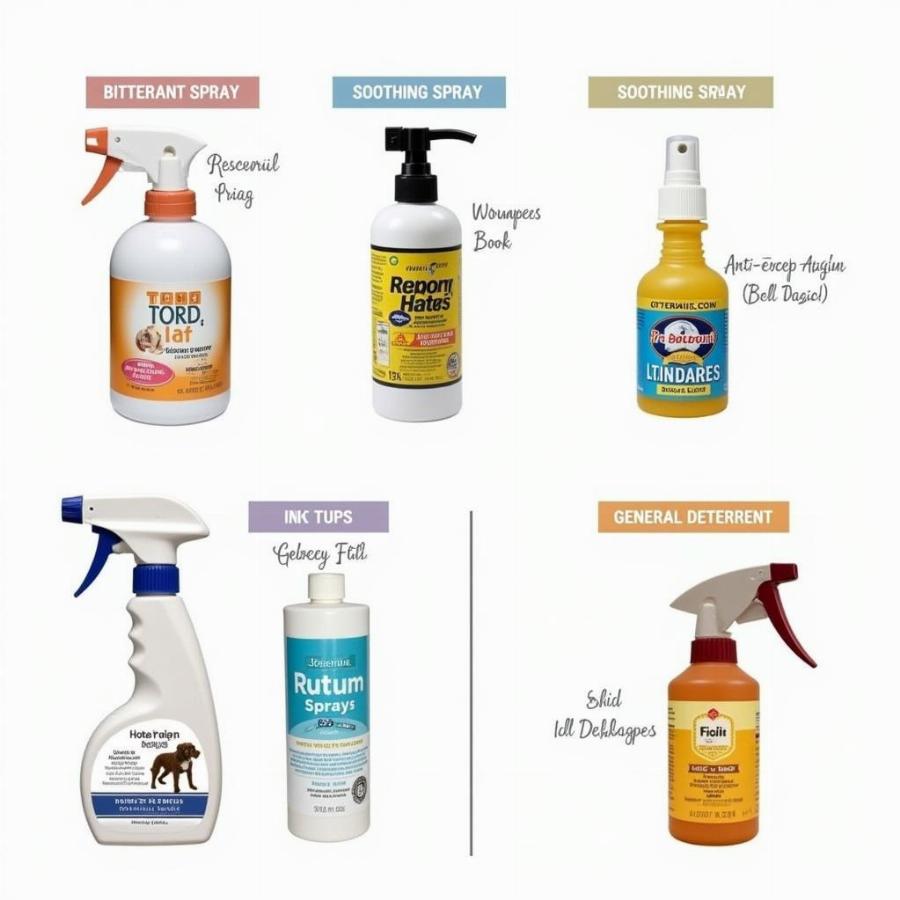Excessive licking can be a frustrating problem for dog owners. Whether your furry friend is obsessively grooming themselves, constantly licking a wound, or driving you crazy by licking furniture, an anti dog licking spray can offer a solution. This guide provides valuable insights into the different types of sprays, how to choose the right one for your dog, and how to use them effectively. We’ll also delve into the reasons why dogs lick excessively, offering tips on how to address the underlying causes.
Understanding Why Dogs Lick
Before reaching for anti dog licking spray, it’s essential to understand why your dog is licking in the first place. Is it due to a medical condition, anxiety, boredom, or simply a bad habit? Addressing the root cause is crucial for long-term success. Allergies, for instance, can cause intense itching, leading to excessive licking. Similarly, anxiety or boredom can trigger compulsive licking behaviors. Injuries and hot spots are another common culprit. Identifying the reason for your dog’s licking is the first step towards finding the right solution.
Choosing the Right Anti Dog Licking Spray
The market offers a variety of anti dog licking sprays, each with its own formulation and purpose. Some sprays contain bitterants, designed to deter licking by making the area taste unpleasant. Others contain soothing ingredients like aloe vera or chamomile to calm irritated skin. When selecting a spray, consider your dog’s specific needs. For wound healing, look for sprays with antiseptic properties. For allergies, opt for hypoallergenic formulas.
 Different Types of Anti Licking Sprays for Dogs
Different Types of Anti Licking Sprays for Dogs
How to Use Anti Dog Licking Spray Effectively
Using anti dog licking spray correctly is vital for its effectiveness. Always follow the manufacturer’s instructions. Start by cleaning the affected area, then apply the spray evenly. For wounds, ensure the spray is vet-approved. Monitor your dog closely after application to prevent them from ingesting the spray.
Homemade Anti Dog Licking Spray Options
Some pet owners prefer making their own anti dog licking spray using natural ingredients. While homemade sprays can be a cost-effective alternative, it’s crucial to ensure the ingredients are safe for your dog. Common ingredients include apple cider vinegar and citrus fruits. However, always consult with your veterinarian before using any homemade remedies. If your dog is gnawing at their paws excessively, a homemade spray might provide relief, but it’s essential to rule out any underlying allergies or infections. For more insight into paw gnawing, check out our article on dog gnawing on paws.
When to Consult a Veterinarian
While anti dog licking spray can be helpful, it’s essential to remember that it’s not always a cure-all. If your dog’s licking persists or worsens, consult a veterinarian. They can diagnose the underlying cause and recommend appropriate treatment. Sometimes, excessive licking can indicate a more serious medical condition that requires professional attention.
Are There Side Effects of Anti-Licking Spray?
Most anti-licking sprays are safe when used as directed. However, some dogs may experience mild side effects like temporary discomfort or skin irritation. Always test a small area first before applying the spray liberally. If your dog exhibits any adverse reactions, discontinue use and consult your veterinarian. Just like some dogs can be allergic to grass causing excessive licking and itching, they could potentially be sensitive to ingredients in certain sprays. To learn more about grass allergies in dogs, visit our guide on can dogs be allergic to grass.
What if my dog licks the spray off?
Most anti-licking sprays are formulated to be safe if ingested in small amounts. The bitter taste is usually enough to deter further licking. However, large amounts can cause gastrointestinal upset.
Can I use anti-licking spray on a puppy?
Yes, but choose a spray specifically formulated for puppies and always consult your veterinarian beforehand.
What are some natural alternatives to anti-licking spray?
Some natural alternatives include Elizabethan collars, also known as dog protective collar, and distraction techniques.
How do I prevent my dog from licking furniture?
Training, environmental enrichment, and deterrents like apple cider vinegar dog spray can help.
How do I stop my dog from licking a wound?
Use a vet-approved antiseptic spray and consider using a cone or protective bandage. For a natural approach, read our guide on homemade spray to stop dog licking wound.
Conclusion
Anti dog licking spray can be a valuable tool in managing excessive licking, but it’s crucial to understand the underlying cause of the behavior. By addressing the root of the problem and choosing the right spray, you can help your furry friend break the licking habit and improve their overall well-being.
FAQ
-
What are the most common reasons for excessive dog licking?
- Allergies, anxiety, boredom, injuries, and hot spots.
-
How do I choose the right anti-licking spray?
- Consider your dog’s specific needs, such as wound healing or allergy relief.
Dr. Emily Carter, DVM, a renowned veterinarian specializing in canine behavior, suggests, “Always address the root cause of excessive licking. A spray is a tool, but understanding ‘why’ is key.”
Dr. Andrew Miller, PhD in Animal Behavior, adds, “Enrichment and positive reinforcement can be highly effective in curbing compulsive licking.”
Beaut Dogs is your trusted source for all things dog-related. We offer expert advice, helpful tips, and a wealth of information to help you provide the best care for your canine companion. For personalized guidance and answers to your specific questions, please contact us via Email: [email protected]. We are here to support you and your furry friend. Beaut Dogs at https://beautdogs.com is committed to empowering dog owners with the knowledge they need to navigate the joys and challenges of dog ownership.